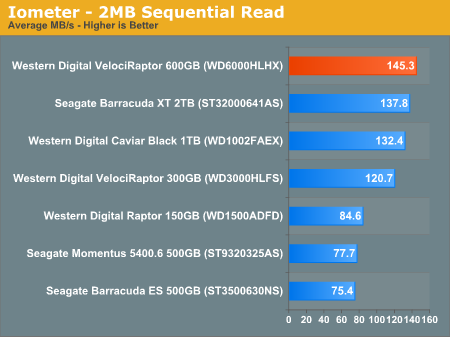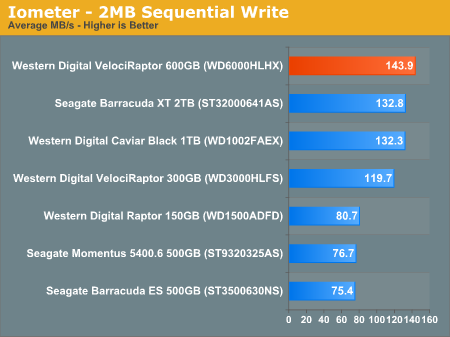Western Digital's New VelociRaptor VR200M: 10K RPM at 450GB and 600GB
by Anand Lal Shimpi on April 6, 2010 8:00 AM EST- Posted in
- Storage
Sequential Read/Write Speed
Using the latest build of Iometer I ran a 3 minute long 2MB sequential test over the entire span of the drive. The results reported are in average MB/s over the entire test length:

This chart shows us Western Digital's problem. Prior to the VR200M series, high end current generation 1TB and 2TB drives were faster than the VelociRaptor. While it still had lower access times, the higher platter density of these newer TB drives gave them a measurable advantage in sequential write speed.
The new 600GB VelociRaptor restores balance to the force and outpaces the old one by 20%. Newer drives are still behind, but the VR advantage is between 5 - 10%.

Unlike SSDs, hard drives have fairly symmetrical read/write performance. There are no changes here. Note that in terms of sequential performance, a 5400RPM notebook drive is roughly as fast as the old 150GB Raptor from 2006.










77 Comments
View All Comments
HotFoot - Tuesday, April 6, 2010 - link
People used to buy Raptors for the superior seek times. Where these drives were great was for loading programs. Throughput on large files isn't usually the consideration. RAID 0 does boost throughput, but increases seek time.But Raptors will never touch even the lowest-performance SSDs for random IO. These drives are completely obsolete as far as I can tell.
DanNeely - Tuesday, April 6, 2010 - link
Not quite completely, but the number of cases where a 7200RPM drive isn't fast enough, several hundred GB of high speed storage space is needed, and a $600-2000 sticker price for several SSDs is too high is much smaller than the raptor market was several years ago.I doubt we'll see a raptor revision after this one unless the cost of turning a SAS drive into a raptor is negligible.
marraco - Tuesday, April 6, 2010 - link
Worse, to match the storage capacity of the 450Gb raptor, you only need to use 10% of each 2Tb disk. This way you short stroke it, accelerating seek and random times.If you own an X58 chipset, you also may use the first partition as RAID0, and the remaining 90% space in RAID 0, or witouth RAID.
coolkev99 - Wednesday, April 7, 2010 - link
Not quite fair to compare the MSRP of a drive that's not even in the retail channel, to the discount OEM price of an existing drive.Belard - Tuesday, April 6, 2010 - link
Anyone else notice that "VR200M" is Subliminal Message to say "VROOM" as in fast? :)But these Raptors are simply not worth it any more. $330 for 600GB drive? Also they are the LOUDEST drives you can get over any other HD... and of course SDs wins hands down ag 0db.
The best setup is still the Hybrid SSD+HD for desktops.
$225 = 80GB intel X25-M G2 (Come on G3)
$ 85 = 1TB Seagate 7200.12 (On this review, Seagate are the quietest drives and its what I use)
$310 = Total for 1.08GB of storage that would dominate any Raptor.
synaesthetic - Tuesday, April 6, 2010 - link
No, not one 80GB X-25M.Two 40GB X-25V in RAID 0.
:D
Romulous - Monday, August 30, 2010 - link
You need to look at the point of the Raptor. Cheap, fast enterprise drives, which is a middle ground between sata and sas. I've setup several vsphere servers with 300GB raptors in raid 10 (8 drives) and they perform very well. Infact, even better than 8 15k sas drives in raid 5 on the same controller. For Virtual Machines, they work great. Of course this is no SAN thus no clustering is available.Xenoterranos - Tuesday, April 6, 2010 - link
Definitely glad I bought a 1TB caviar black. The performance benefits just aren't there given the loss in drive space, but for a high-end notebook, I could see it being a real competitor.AssBall - Tuesday, April 6, 2010 - link
.... Except that it is too tall to fit in notebooks.Glenn - Tuesday, April 6, 2010 - link
I bought into the first three generations of Raptors for the seek times. That is the single most irritating thing for me when using a higher performance computer. Damn HDs always slow everything down. I have migrated to SSDs now and will never look back.And often left unsaid in Raptor discussions, is their propensity to get noisier and noisier over there lifespan, to the point you think there are gremlins living inside your computer!